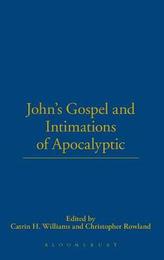
|
John's Gospel and Intimations of Apocalyptic
Hardback
Main Details
| Title |
John's Gospel and Intimations of Apocalyptic
|
| Authors and Contributors |
Edited by Dr. Catrin H. Williams
|
|
Edited by Christopher Rowland
|
| Physical Properties |
| Format:Hardback | | Pages:344 | | Dimensions(mm): Height 234,Width 156 |
|
| Category/Genre | Biblical studies |
|---|
| ISBN/Barcode |
9780567618528
|
| Classifications | Dewey:226.5 |
|---|
| Audience | | Professional & Vocational | |
|---|
|
Publishing Details |
| Publisher |
Bloomsbury Publishing PLC
|
| Imprint |
T.& T.Clark Ltd
|
| Publication Date |
21 November 2013 |
| Publication Country |
United Kingdom
|
Description
John's Gospel has traditionally been regarded as the least apocalyptic document in the New Testament. This exciting new collection redresses the balance by exploring the ways in which the apocalyptic literature of Second Temple Judaism has contributed to the theology and outlook of John's Gospel. Given that John, like the Jewish apocalyptic texts, is primarily concerned with the theme of revelation, the contributors examine how apocalyptic ideas can help to explain the Johannine portrayal of Jesus as the messenger sent from heaven to reveal the divine mysteries, as well as the Gospel's presentation of the activity of the Spirit, its understanding of evil, and the intended effects of this 'apocalypse in reverse' on its readers and hearers. The highly distinguished contributors include, John Ashton, Christopher Rowland, April DeConick, Judith Lieu and Jorg Frey.
Author Biography
Catrin H. Williams is Senior Lecturer in Biblical Studies at the University of Wales Trinity St David, UK. Christopher Rowland is Professor of the Exegesis of Holy Scripture at Queen's College, University of Oxford, UK.
ReviewsThese essays help redefine the categories with which we approach apocalyptic writings and John's Gospel. Instead of limiting the comparison to eschatology, they propose new ways to consider what each type of literature helps us see in the other. The result is not a new consensus, but a promising series of leads, which invite discussion around questions of how the hidden purposes of God are revealed. -- Craig R. Koester, Luther Seminary, Saint Paul, US * Theology * A worthy tribute to the eminent Johannine scholar, John Ashton. * The Heythrop Journal * The Fourth Gospel has a way of stopping readers in their tracks, making us question what we thought we knew, turning upside down what we took for granted. That happens to characters in its story, also-and thus, in an odd way, we find ourselves drawn into that story. Two decades ago, John Ashton did something rather similar to scholarship about the Fourth Gospel. In this book he and a goodly company of colleagues have done it again. -- Wayne A. Meeks, Yale University, USA In his book Understanding the Fourth Gospel John Ashton gave an outstanding presentation of modern research on the Gospel of John. He also gave fruitful pointers for future research, as was seen at a symposium where he and other distinguished scholars explored further his description of John's Gospel as "an apocalypse - in reverse, upside down, inside out." Central themes discussed were the concept of revelation, the understanding of evil, the Christological concept of Jesus as God's filial Agent, and how apocalyptic motifs find their proleptic fulfillment in Jesus' death and resurrection. It is fortunate, indeed, that these seminal contributions now are made available in book form! -- Peder Borgen, Norwegian University of Science and Technology, Trondheim, Norway This is the book I and many others have been waiting for, since the Gospel of John is not an obvious and immediate choice as an 'apocalyptic Gospel'. This much needed book discusses the heuristically important links between apocalyptic and John's Gospel, with an openness for the possibility of 'intimations of apocalyptic' in the Gospel. The different perspectives from which these relationships are reconsidered, illuminate the meaning and margins of apocalyptic within the Johannine context, leading to new and challenging interpretations of the Johannine material. This is certainly a book that will leave its impact on Johannine studies. -- Jan van der Watt, Radboud University Nijmegen, Netherlands
|